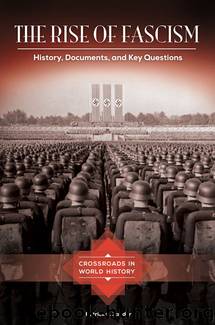The Rise of Fascism: History, Documents, and Key Questions by Zander Patrick

Author:Zander, Patrick
Language: eng
Format: epub
ISBN: 9781610698009
Publisher: ABC-CLIO
Published: 2016-01-31T05:00:00+00:00
NUREMBURG LAWS The “Nuremburg Laws” were two acts of legislation passed by the German government in September 1935 that expanded and intensified the existing persecution of Jews in Germany. Nazi ideology had been fanatically anti-Semitic from its origins and the Nazi state had taken actions to limit the rights of Jews since its establishment by Adolf Hitler in 1933. By 1935, however, there remained questions as to who actually qualified as being Jewish. There also were a number of areas of German life in which Jews had the legal freedom to mix with people considered racially “Aryan.” These areas were addressed in the Nuremburg Laws; after their enactment, conditions for Jews in Germany deteriorated steadily. One key stipulation of the Nuremburg Laws was that which revoked Jews’ German citizenship and gave them the legal status of “state subjects,” with diminished legal rights.
From the earliest days of the Hitler regime in Germany, the Nazi Party pursued legal strategies to institutionalize their group’s fanatical prejudice against and hatred of Jews. The first of these official state actions against Jews—the state “Boycott of Jewish Businesses”—was launched on April 1, 1933. Only a week later, on April 7, the government passed the “Law for the Restoration of the Professional Civil Service,” which removed Jews from their positions in Germany’s civil bureaucracy and banned them from holding such positions in the future. These and other measures served to gradually remove Jews from government, business leadership, and cultural life.
The most fanatical elements of the Nazi Party—known as the Alte Kampfers (“old fighters”)—however, insisted that Jews still enjoyed too many rights and still played too great a role in German society. Their hysterical anti-Semitism convinced them that this meant that Jews were still able to corrode and corrupt German society from within. Because of this tension, by 1935 the Nazi organizations such as the Sturmabteilung (SA) began launching unofficial violent attacks on Jews. They formed barriers preventing consumers from entering Jewish businesses, they spray-painted the windows of Jewish businesses with hostile graffiti, and they bullied and intimidated Jews on the streets.
One member of the Nazi government spoke out about the negative effects of this constant campaign of disorganized violence against Jews. Hjalmar Schacht was the minster of economics in Hitler’s government at the time, and was responsible for growing the German economy and finding the economic wherewithal to fund a giant program of rearmament. Schacht spoke out, saying that Jews ran several important businesses, had much to contribute to building the economy, and that this contribution was being undermined as Jewish businesses were wrecked or driven under. Schacht asserted that an organized, state-sponsored, and legal program must be put in place to accomplish the state’s anti-Semitic goals. Such a legally based approach would remove rights from Jews without undermining the German economy in the short term. Based on Schacht’s ideas, calls within the Nazi Party then increased for tough laws to be issued—especially those preventing biological mixing between Jews and Germans, which the Nazis believed contributed to “racial defilement.
Download
This site does not store any files on its server. We only index and link to content provided by other sites. Please contact the content providers to delete copyright contents if any and email us, we'll remove relevant links or contents immediately.
| Anthropology | Archaeology |
| Philosophy | Politics & Government |
| Social Sciences | Sociology |
| Women's Studies |
The Secret History by Donna Tartt(19002)
The Social Justice Warrior Handbook by Lisa De Pasquale(12177)
Thirteen Reasons Why by Jay Asher(8874)
This Is How You Lose Her by Junot Diaz(6857)
Weapons of Math Destruction by Cathy O'Neil(6249)
Zero to One by Peter Thiel(5767)
Beartown by Fredrik Backman(5718)
The Myth of the Strong Leader by Archie Brown(5482)
The Fire Next Time by James Baldwin(5409)
How Democracies Die by Steven Levitsky & Daniel Ziblatt(5200)
Promise Me, Dad by Joe Biden(5132)
Stone's Rules by Roger Stone(5065)
A Higher Loyalty: Truth, Lies, and Leadership by James Comey(4937)
100 Deadly Skills by Clint Emerson(4900)
Rise and Kill First by Ronen Bergman(4761)
Secrecy World by Jake Bernstein(4727)
The David Icke Guide to the Global Conspiracy (and how to end it) by David Icke(4685)
The Farm by Tom Rob Smith(4489)
The Doomsday Machine by Daniel Ellsberg(4474)
